
An orchestra is a large instrumental ensemble typical of classical music, which combines instruments from different families. There are typically four main sections of instruments:
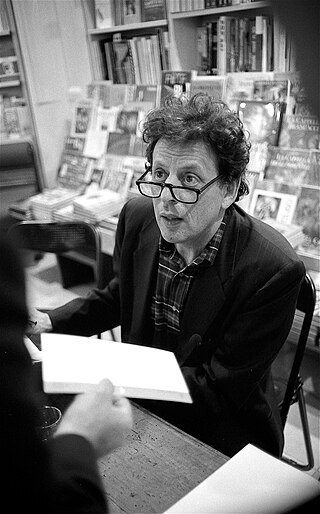
Philip Glass is an American composer and pianist. He is widely regarded as one of the most influential composers of the late 20th century. Glass's work has been associated with minimalism, being built up from repetitive phrases and shifting layers. Glass describes himself as a composer of "music with repetitive structures", which he has helped to evolve stylistically.
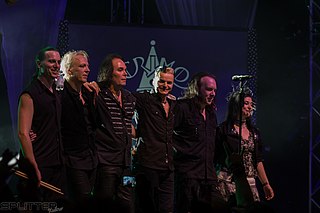
Lacrimosa is a Swiss gothic metal band led by German musician Tilo Wolff, who is also the main composer, and Finn Anne Nurmi. They are currently based in Switzerland, but originally from Germany. Originally counted among the bands of the Neue Deutsche Todeskunst genre, Lacrimosa are most commonly associated with the gothic metal genre.

David Vickerman Bedford was an English composer and musician. He wrote and played both popular and classical music. He was the brother of the conductor Steuart Bedford, the grandson of the composer, painter and author Herbert Bedford and the composer Liza Lehmann, and the son of Leslie Bedford, an inventor, and Lesley Duff, a soprano opera singer.
Symphonic metal is a cross-generic style designation for the symphonic subsets of heavy metal music subgenres. It is used to denote any metal band that makes use of symphonic or orchestral elements. The style features the heavy drums and guitars of metal with different elements of orchestral classical music, such as symphonic instruments, choirs and sometimes a full orchestra, or just keyboard orchestration.
Thomas Wilson CBE FRSE was an American-born Scottish composer, a key figure in the revival of interest in Scottish classical music after the second world war.
Autumn Tears is an international dark wave band formed in September 1995 by Erika Swinnich, and Ted Tringo. Their music has goth, and industrial rock characteristics. The band does not use conventional electric guitars, but uses operatic orchestration.
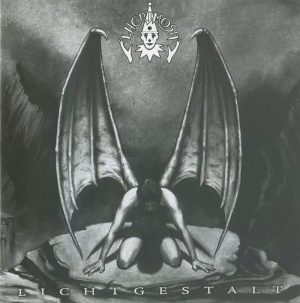
Lichtgestalt is a 2005 album by German gothic rock duo Lacrimosa. The album was released on 2 May 2005 by Hall of Sermon.

Fassade is the seventh album by German duo Lacrimosa released on 1 October 2001 by Hall of Sermon and Nuclear Blast.

Tilo Wolff is a German musician and artist. He was born in Frankfurt am Main and currently lives in Switzerland.
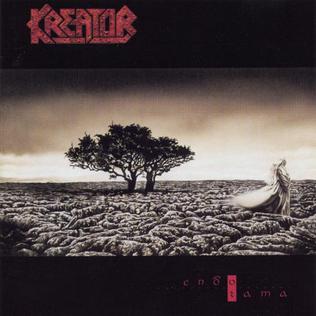
Endorama is the ninth studio album by German thrash metal band Kreator, released on 20 April, 1999 by Drakkar Records. The gothic metal influences were the most prominent on this release, and Lacrimosa frontman Tilo Wolff provided guest vocals on the title song.
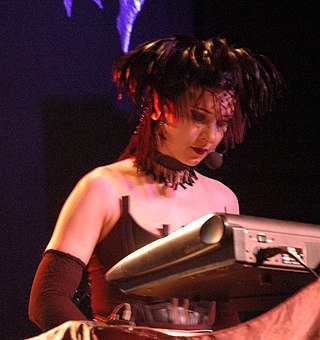
Anne Marjanna Nurmi is a Finnish singer, composer and keyboard player who is a member of the band Lacrimosa. She lives in Switzerland.

Greatest Hits is a compilation album by the progressive rock band the Moody Blues, released in 1989. The band recorded new versions of "Isn't Life Strange" and "Question" with orchestration by the London Symphony Orchestra. The arrangements were overseen by Anne Dudley, who also produced the recordings with Justin Hayward and John Lodge. In 1990, only a year after its original release, the album was re-released as Legend of a Band: The Story of the Moody Blues with different artwork to coincide with the release of the home video documentary of the same name.

Angst is the debut album by German dark wave band Lacrimosa. It was released in 1991.
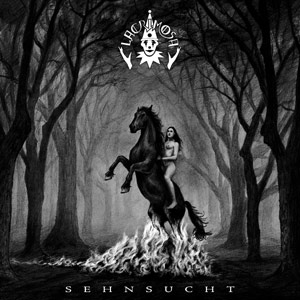
Sehnsucht is the tenth album by the German gothic rock duo Lacrimosa, released on 8 May 2009. Singer and producer Tilo Wolff wanted to create an album that was less conceptual and more spontaneous than the previous releases by Lacrimosa. Therefore, Sehnsucht features a great variability of musical expressions like a sarcastic track "Feuer" and the tender song "Call Me With The Voice Of Love". The planned release of a vinyl format album was cancelled shortly before the final release of Sehnsucht.

Echos is the eighth studio album by Switzerland-based Gothic rock band Lacrimosa. It features classically influenced Gothic-themed rock music. The title is German for "echoes". The record was released on 27 January 2003 by Hall Of Sermon.
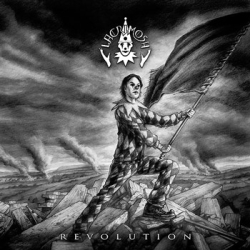
Revolution is the 11th studio album by the German gothic rock duo Lacrimosa. It was released on 7 September 2012 by Hall of Sermon. The album provides a mix of musical styles like classical instrumentation and aggressive rock.
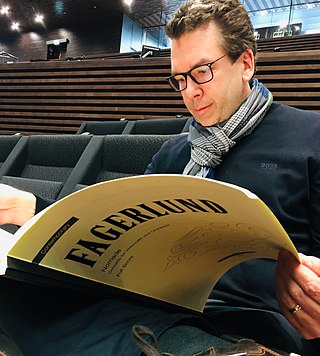
Sebastian Fagerlund is a Finnish composer. He is described as “a post-modern impressionist whose sound landscapes can be heard as ecstatic nature images which, however, are always inner images, landscapes of the mind”. Echoes of Western culture, Asian musical traditions, and heavy metal have all been detected in his music.

Einsamkeit is the second studio album by a German dark wave band Lacrimosa. It was released in 1992.
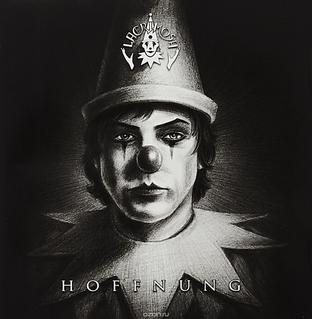
Hoffnung (transl. Hope) is the 12th studio album by the German gothic rock duo Lacrimosa. The album was released on November 6, 2015, by Hall of Sermon label.

















